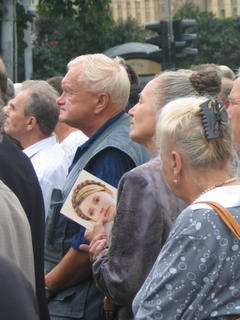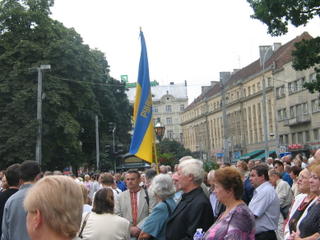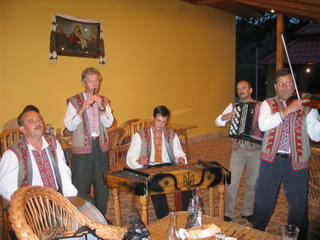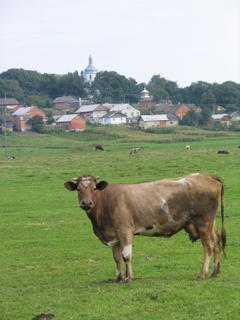Read the following RFE article on growing disillusionment with the orange government here.
My comments on the growing disillusionment as I have observed it:
In a previous post, I mentioned that it seemed to me that all the rumors are true, that the majority of people in Ukraine seem increasingly disillusioned with the orange government, as I like to call it. However, after having spent more time in Ukraine since then, I have now come to feel that this comment, while true, needs to be strongly qualified.
But first, one should know that the degree of disillusionment varies.
To begin with, everywhere I have been thus far in Ukraine (Kyiv, Poltava, Yabloniv in the Carpathians, Ivano-Frankivsk, L'viv, Pidhajtsi), people say that things now are much worse than they were a year ago. In some senses, this is certainly true. The economic situation in Ukraine indeed has become more difficult, but for a variety of reasons which I will discuss more below. However, the most disillusioned folks in Ukraine like to blame the orange government entirely for this, and such people are also the ones who most frequently claim that orange politicians are oligarchs just the same as Kuchma et al. We'll call these folks Group A (GA).
And by the way, I am talking here about people who voted for and supported Yushchenko, of course; the pro-Yanukovych camp has been making noise since Yushchenko was inaugurated, and so one can't say that they have become disillusioned. In fact, one should investigate the opposite case among them: How many former Yanukovych supporters now, almost a year later, have come to support the orange government, either actively or passively?
Then there are those whose disillusionment is a bit more nuanced. The more-nuanced-but-yet-disillusioned folks show an appreciation for the difficulty of the tasks facing the orange government (Ukraine being ranked for 2004 as one of the top 25 most corrupt governments in the world), and some even show an understanding that the entire world economy is facing crisis (especially in energy). However, this group of people usually say that inspite of all these obstacles, they still blame the orange government for all the problems facing Ukraine almost a year after the OR because, as they say, it has incompetently handled and thus done nothing to contain or alleviate these global economic and geopolitical pressures on Ukraine's very fragile internal situation, making things worse in Ukraine today than they should be. We'll call such folks Group B (GB).
Thus, one can say that Groups A and B have turned against the orange government; and I will mention below one west Ukrainian with whom I have talked who has gone from skeptical approval of Yushchenko during the OR to outright support of his former opponent, Viktor Yanukovych.
Then there are those of Group C (GC) whose overall approval of the government is still very high, even if they are upset in many ways with the orange government. They usually agree with the GB people in general, but are willing to forgive the orange goverment for its errors and youthfulness, and say that of course the economic situation in the country can not have improved much in hardly a year. They also have, in my opinion, a better and more significant appreciation of how the world energy crisis and Russian control of Ukraine's oil supply really has the orange government's hands tied. The real or main cause of this group's unhappiness was the first-brat affair and Yushchenko's handling of it. Also, some in this camp remain bitter that Zvarych remains in government, and they also are not pleased at what they percieve to be the weak way in which the government has gone after corrupt officials, but also are grateful for what has been accomplished in this respect. Many also have a low opinion of Poroshenko, and some within this group will say that they think less and less of Yushchenko and more and more of Tymoshenko.
Finally, there is Group D. These are the folks whose dedication and approval of the orange government is unchanged. They usually are folks who don't know much about history or politics, and/or are painful idealists, etc. These are the people who practically deify Yushchenko.
Now, for my comments. First of all, this obviously is not a scientific study but comments entirely based on my conversations with quite a large number and variety of people: professional people, students, professors, and former journalists; average workers, taxi drivers, etc.; and then villagers engaged in everday subsistence farming, etc. I have also talked with former Pora! activists and one person with a current government post (at the county or rajon level, one who is ranked third in his county administration).
The people of Group D and C are people who, in general, played a very active role in the OR. They are those who before the OR canvassed for Yushchenko or openly talked a great deal about him, who went to rallies before the elections, or who in general were quite engaged. later they went to demos either in Kyiv or locally, etc., and they are one who went not because it was the cool thing to do at the time, but because of real feeling. They were not passive observers of change, but among those who were the active makers.
It is my feeling that most of the people of Group B and just about all of those of Group A were people who watched things last year as they took place on TV. For example, the most vehement of disillusioned haters (I would say) of the new orange government that I have met is a west Ukrainian who I know watched the whole thing on TV, who did not even go to a single local demonstration in his hometown, and whose son in fact worked for the local Yanukovych campaign headquarters. The son at first said that he did so because he had the noble goal of promoting political pluralism in his hometown that was clearly, overwhelmingly in favor of Yushchenko; later, he claimed he did so as a spy for the Yushchenko campaign. Everyone knew, however, that it was just for the money (the Yanukovych campaign paid something near $1,000 or more to his campaign workers in certain parts of western Ukraine, demanding in return that they deliver a certain percentage of votes, by whatever means necessary). This man told me that, "If they say we are going to Kyiv this year with machine guns and that we are gonna open fire at the parliament and shoot down all of the politicians, this time I would be going!"
The majority of Ukrainians did not actively get up and demonstrate during the OR. The critical mass of Ukrainians however did, and they did represent the feelings of anger and frustration and disgust held by the majority. This is true of every revolution; the majority may support it with their anger and rage, but only a critical mass actually join in the fight. The majority of Ukrainians did vote for Yushchenko, and given that the majority of those who voted did not demonstrate, it is no suprise to me that the majority of them are now feeling disillusioned to the point of rejecting that government they voted for--they expected the world to change, as they free-rode on the efforts of others. Those who actively participated continue to actively support the orange government in general. Those who sat and waited and passively thought about things are the first ones to have become severely disillusioned. As my friend Volodymyr Kish in Kyiv said to me, things would be much easier for the orange government if it had not come to power through a revolution.
 Ukrainian Independence Day2005 in L'viv, by the Monument to Taras Shevchenko
Ukrainian Independence Day2005 in L'viv, by the Monument to Taras Shevchenko
My comments on the growing disillusionment as I have observed it:
In a previous post, I mentioned that it seemed to me that all the rumors are true, that the majority of people in Ukraine seem increasingly disillusioned with the orange government, as I like to call it. However, after having spent more time in Ukraine since then, I have now come to feel that this comment, while true, needs to be strongly qualified.
But first, one should know that the degree of disillusionment varies.
To begin with, everywhere I have been thus far in Ukraine (Kyiv, Poltava, Yabloniv in the Carpathians, Ivano-Frankivsk, L'viv, Pidhajtsi), people say that things now are much worse than they were a year ago. In some senses, this is certainly true. The economic situation in Ukraine indeed has become more difficult, but for a variety of reasons which I will discuss more below. However, the most disillusioned folks in Ukraine like to blame the orange government entirely for this, and such people are also the ones who most frequently claim that orange politicians are oligarchs just the same as Kuchma et al. We'll call these folks Group A (GA).
And by the way, I am talking here about people who voted for and supported Yushchenko, of course; the pro-Yanukovych camp has been making noise since Yushchenko was inaugurated, and so one can't say that they have become disillusioned. In fact, one should investigate the opposite case among them: How many former Yanukovych supporters now, almost a year later, have come to support the orange government, either actively or passively?
Then there are those whose disillusionment is a bit more nuanced. The more-nuanced-but-yet-disillusioned folks show an appreciation for the difficulty of the tasks facing the orange government (Ukraine being ranked for 2004 as one of the top 25 most corrupt governments in the world), and some even show an understanding that the entire world economy is facing crisis (especially in energy). However, this group of people usually say that inspite of all these obstacles, they still blame the orange government for all the problems facing Ukraine almost a year after the OR because, as they say, it has incompetently handled and thus done nothing to contain or alleviate these global economic and geopolitical pressures on Ukraine's very fragile internal situation, making things worse in Ukraine today than they should be. We'll call such folks Group B (GB).
Thus, one can say that Groups A and B have turned against the orange government; and I will mention below one west Ukrainian with whom I have talked who has gone from skeptical approval of Yushchenko during the OR to outright support of his former opponent, Viktor Yanukovych.
Then there are those of Group C (GC) whose overall approval of the government is still very high, even if they are upset in many ways with the orange government. They usually agree with the GB people in general, but are willing to forgive the orange goverment for its errors and youthfulness, and say that of course the economic situation in the country can not have improved much in hardly a year. They also have, in my opinion, a better and more significant appreciation of how the world energy crisis and Russian control of Ukraine's oil supply really has the orange government's hands tied. The real or main cause of this group's unhappiness was the first-brat affair and Yushchenko's handling of it. Also, some in this camp remain bitter that Zvarych remains in government, and they also are not pleased at what they percieve to be the weak way in which the government has gone after corrupt officials, but also are grateful for what has been accomplished in this respect. Many also have a low opinion of Poroshenko, and some within this group will say that they think less and less of Yushchenko and more and more of Tymoshenko.
Finally, there is Group D. These are the folks whose dedication and approval of the orange government is unchanged. They usually are folks who don't know much about history or politics, and/or are painful idealists, etc. These are the people who practically deify Yushchenko.
Now, for my comments. First of all, this obviously is not a scientific study but comments entirely based on my conversations with quite a large number and variety of people: professional people, students, professors, and former journalists; average workers, taxi drivers, etc.; and then villagers engaged in everday subsistence farming, etc. I have also talked with former Pora! activists and one person with a current government post (at the county or rajon level, one who is ranked third in his county administration).
The people of Group D and C are people who, in general, played a very active role in the OR. They are those who before the OR canvassed for Yushchenko or openly talked a great deal about him, who went to rallies before the elections, or who in general were quite engaged. later they went to demos either in Kyiv or locally, etc., and they are one who went not because it was the cool thing to do at the time, but because of real feeling. They were not passive observers of change, but among those who were the active makers.
It is my feeling that most of the people of Group B and just about all of those of Group A were people who watched things last year as they took place on TV. For example, the most vehement of disillusioned haters (I would say) of the new orange government that I have met is a west Ukrainian who I know watched the whole thing on TV, who did not even go to a single local demonstration in his hometown, and whose son in fact worked for the local Yanukovych campaign headquarters. The son at first said that he did so because he had the noble goal of promoting political pluralism in his hometown that was clearly, overwhelmingly in favor of Yushchenko; later, he claimed he did so as a spy for the Yushchenko campaign. Everyone knew, however, that it was just for the money (the Yanukovych campaign paid something near $1,000 or more to his campaign workers in certain parts of western Ukraine, demanding in return that they deliver a certain percentage of votes, by whatever means necessary). This man told me that, "If they say we are going to Kyiv this year with machine guns and that we are gonna open fire at the parliament and shoot down all of the politicians, this time I would be going!"
The majority of Ukrainians did not actively get up and demonstrate during the OR. The critical mass of Ukrainians however did, and they did represent the feelings of anger and frustration and disgust held by the majority. This is true of every revolution; the majority may support it with their anger and rage, but only a critical mass actually join in the fight. The majority of Ukrainians did vote for Yushchenko, and given that the majority of those who voted did not demonstrate, it is no suprise to me that the majority of them are now feeling disillusioned to the point of rejecting that government they voted for--they expected the world to change, as they free-rode on the efforts of others. Those who actively participated continue to actively support the orange government in general. Those who sat and waited and passively thought about things are the first ones to have become severely disillusioned. As my friend Volodymyr Kish in Kyiv said to me, things would be much easier for the orange government if it had not come to power through a revolution.
 Ukrainian Independence Day2005 in L'viv, by the Monument to Taras Shevchenko
Ukrainian Independence Day2005 in L'viv, by the Monument to Taras Shevchenko RUNvira on Shevchenko Square on Independence Day 2005
RUNvira on Shevchenko Square on Independence Day 2005RUNvira is one of a few groups in Ukraine who oppose Christianity and that seek to rejuvenate the pre-Christian or animist religion of the ancient Slavs. I have sympathy with their appreciation for animist religion; however, this group holds some really cooky and zainy views, at least officially-- I don't know if individuals hold much of them. One zainy view is the notion that Volodymyr the Great was from a northern dynasty (i.e., a Russian one) who imposed a foriegn religion (christianity) on the Rus'. So, in other words, Orthodoxy is Russian Imperialism and it all began with Volodymyr. To save Ukraine, Ukrainians need to reject Orthodoxy. Also, the founder of the movement was a virulent anti-Semite, and said to be a Nazi collaborator. In this case, I don't think this is mere propaganda to discredit the group. I think it is a truth about the founder and perhaps a number of followers. But there is much that is interesting about attempts to rejuvenate pre-Christian religion, if it can seperate itself from the tendency toward anti-Semitism and silly, or wily-nily, Russophobia.
Anyhow, RUNvira showed up on the square in front of the Taras Shevchenko monument on Independence Day to protest their exclusion from the all-denominational ceremony that took place there. There were maybe three or four of them.
Anyhow, RUNvira showed up on the square in front of the Taras Shevchenko monument on Independence Day to protest their exclusion from the all-denominational ceremony that took place there. There were maybe three or four of them.
 Chornabryvtsi
ChornabryvtsiAn interesting story: A year or so ago, a major Chinese director came to Yabloniv, a village outside of Kolomyja where a good friend comes from and where I have spent much time the last two summers with her and her family. I forget the name of the director, but he wanted to film a major Chinese release here about a love story. He somehow was acquainted and enchanted with the Ukrainian Carpathians, and wanted to film a scene of his two major protagonists making love in a field of chornabryvtsi, the flowers pictured above. So a local crew was hired to plant an entire field for the shoot; however, when the director saw the field, he decided it would not work for the film. The people of this village still talk about how the Chinese film crew just spent money flagrantly, from the perspective of a poor villager. One guy talks about how he got $20 for giving a crew member a short ride! $20 can be 1/3 of a monthly wage in many parts of Ukraine!
 Hutsul Musicians at the Restaurant "Arkan," a Very Touristy Spot in the village of Sheshory, State of Ivano-Frankivsk
Hutsul Musicians at the Restaurant "Arkan," a Very Touristy Spot in the village of Sheshory, State of Ivano-Frankivsk 









No comments:
Post a Comment